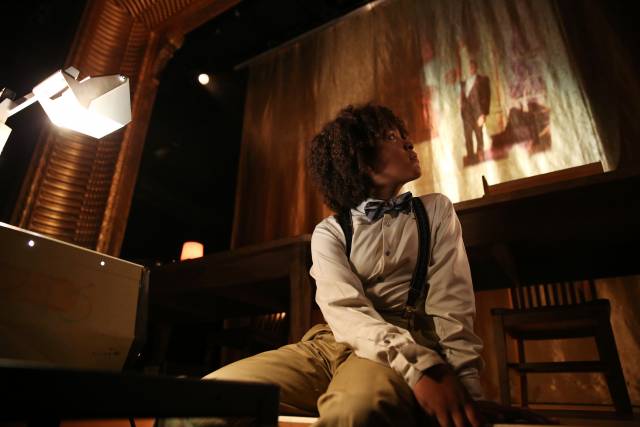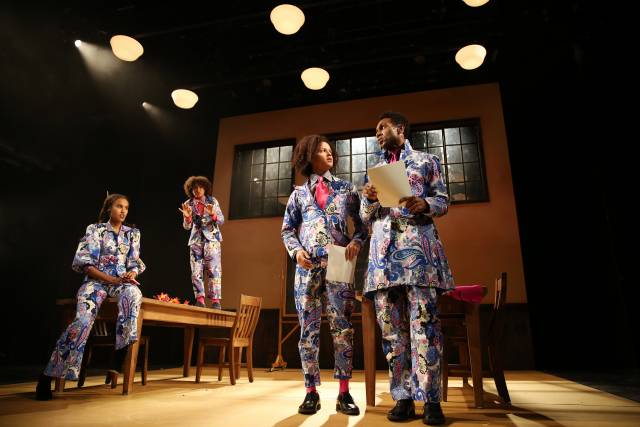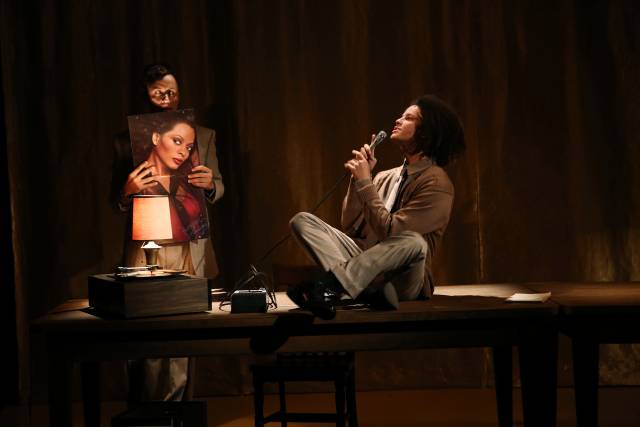

In Duat Daniel Alexander Jones has created a show that truly asks you to surrender your senses upon entering the theater. Making your way to your seat, you find yourself surrounded by cabinets, books, plants and Egyptian figurines that conjure visions of wonder and excitement. On the stage we see two long desks with lamps, and library card drawers, setting the scene for what will be a show that celebrates learning, whether through academic, empirical, or sensual means. Combining elements from solo plays, traditional musical theatre, multimedia storytelling and DJ-ing, Jones creates a riveting spectacle that produces sensations that feel like ripples on a lake, each one emanating suddenly, but taking its time to run its course. To go into much detail about Duat wouldn’t only be a disservice to its multilayered structure, but also would prove futile, given that it’s a show that will most likely produce completely different reactions on individual audience members who will each see a different reflection staring back at them from the ornate, soulful mirror Jones has crafted. I spoke to Jones about the themes behind Duat, creating art as a queer person of color, and the importance of having teacher figures.
Can you describe your show?
Duat is a performance piece that uses the frame of the ancient Egyptian afterlife to investigate a very personal journey, through some of the themes and questions of the time we’re living in, having to do with our individual relationship with this political climate, and to know if we still have the capacity for community, civic closeness, generosity. Part of the play lives in a world of autobiography, it looks at my own youth in a very particular community that was multiracial and generous, part of it is an imagining about some thoughts about our future in a mythical classroom.
The reason why I wanted you to describe the show, is because I was extremely wary of being too “spoilery”, this show has moments that made me say “whoa” out loud, and I want audience members to experience it in a completely fresh way. What is your take on spoilers and how much we should know about the art we’re about to experience?
I always love to get to go to a play, or see a piece of art or a movie, I like to have the experience and then to go read about it. I like being taken on a journey, Duat is a wild ride and I want to invite people to go on the journey, and not worry about “what it means”, but rather to have an experience and then reflect on it. Maybe a week, or a month later they’ll be sitting and the images will still be with them. I love that it made you say “whoa”, because it hit you in your gut, so if it stays with you that’s the best thing for me ever as an artist.
Do you find that plot is a cage?
I’ve never really been drawn to traditional plot, I’m always more interested in experiential, layered pieces. I love plays and movies with traditional plots, but that’s not my thing. If I were purely a musician I’d be a jazz, or avant garde musician, if that’s a good analogy.
I think that comes off in the show too, the first part has you talking about your favorite pop music, but the piece itself feels like jazz.
Yeah, you’re saying everything I hope somebody gets (laughs).

Growing up I loved Egyptology, I was obsessed with mummies and pyramids, so I was pleasantly surprised with what I saw in your show. Can you talk a bit about your love of Egyptology and how it shaped your show?
I, like you, was fascinated with Egypt since I was little. I don’t know what drew me to it, perhaps it was how beautiful the art was, the faces had such spirit and soul to them. I loved the idea of hieroglyphs, having symbols tell a story, imagining ourselves in a world through the symbolic, not just language. I was fascinated by ancient Egyptian religion and its pantheon of gods who represent forces of nature, and staged of life and death. I would dream about them, when I was in elementary school my friends liked Greek and Norse mythology, but Egypt just fascinated me. I was also fascinated by Egypt’s relationship to all the cultures in Africa along the Nile, and how stargazing had to do with the universe outside, as well as the universe inside of us. I’m sure all the same things that fascinated you.
In Egyptian mythology tombs were used as portals through which people could travel to other worlds. Is that what the stage is to you?
That’s absolutely it, I feel the idea of lucid dreaming comes alive in the theater, where we have the opportunity to be with real people in the same room, but we’re all dreaming together in real time into this portal that has opened up for us. That’s partly why in the first part there are these multiple versions of myself, I really do believe we walk around in time connected to the other times we’ve lived through. What would it be to have those veils parted for a moment? What would it be like for you to be in dialogue with your 16 year old self? If those veils were parted, would that make us more compassionate with ourselves and other people?
Ancient civilizations were also so much better at dealing with death, you’re very young, but I’m curious if legacy is something on your mind. Also, how strange was it to cast different versions of yourself?
I may look younger than I really am, I’m 46 (laughs), I’ve been doing solo autobiographical performance for many years. I became interested in the idea of working with someone else to represent a different age, I met Jacques Colimon a couple of years ago when he performed in a musical I’d written, in Austin, Texas. He felt like family to me, something about his spirit, humor and demeanor made me think he’d be the perfect person to work with. I had the pleasure of being introduced to Tenzin Gund-Morrow when he came to see Jomama Jones in concert at Joe’s Pub last year. At that time I didn’t know he was a performer, but I was so struck by him, there was something very familiar in his spirit. When I was working on the structure for the first part of Duat I woke up one day and realized he needed to be in the show too. I called his mom to ask “does he perform?” and she said “does he perform? He’s an old pro!” If you will, these folks were drawn to the project in a way, the same is true for all the actors. No one auditioned, these are all people I wanted to have in this world, they embody many of the ideals of kindness, open-heartedness and generosity.
How did Jomama Jones end up becoming a teacher? I don’t think I ever imagined her being a teacher!
(Laughs) Well, as my alter ego, I channel Jomama. She’s a fully embodied energy and she’s very curious about acting, and she really wanted to play a role in this project. Initially the conversation was about whether she would have a concert, but I wasn’t interested in repeating that form. I was interested in exploring the teacher and the librarian, who resemble archivists in the ancient world. The people who held the knowledge, who taught us something, a mentor, a guiding hand...as that character came to being, Jomama let me know she wanted to play it.

Jomama’s part in the show made me think of how when I was little I wanted the Spice Girls to be my teachers in school…
I love it!
As a queer person of color, I remember looking up to pop divas as teachers. I didn’t have the Church to talk about what was going on inside me, because I was attracted to the altar boy and that was bad! So it was Madonna, Mariah, Judy and Diana who came to the rescue. Can you talk about experiences of your own that turned other artists into teachers, and how this influenced Jomama in Duat?
My heart is so full hearing you talk about the work and how it resonated with you. One of my deepest hopes is to be able to put stories and people on the stage that can reflect back to us, as queer people of color. I don’t want to exclude other audiences, but we so rarely get to have ourselves onstage in a context that belongs to us. I’m trying to write for us, to us and to welcome everybody in the room. Far too often I feel writing is meant for a predominantly white audience, not made on its own terms and shared. I pray for that, so I’m very excited hearing you speak. I’m sure you’ve seen Beyoncé’s Lemonade, at the beginning she’s in her yellow dress breaking things with her baseball bat, that is connected to the image of Oshun in Yoruba culture, the goddess of love who is incredibly beautiful, but can also knock you out. There is some principle inside a person that is reflected in a god or divine presence, Oshun represents a natural principle, Beyoncé can perform and becomes an extension of Oshun. The singers of that era were my saints, my Orisha, my pantheon. When I feel one way I might listen to Patti LaBelle, another way and I’ll listen to Tina Turner...their songs were a text that would minister to me.
There were also other women who taught me, there was a particular burden and gift, that women in general and women of color in particular, had in terms of teaching children in the last 50 years post-integration, which was how to deal in the world. These were women who made sure I knew how to write, knew basic arithmetic and knew about philosophy and history, but they also taught me how to be a good citizen, how to be honest, take risks, they taught me it was important to open my heart up even if I would get hurt. They taught me to dream big, but also to walk on the earth and get things done. I talk about so many different teachers, and that’s also why I have so many people onstage, it’s always about a community.
Duat is now open. For tickets and more information click here.